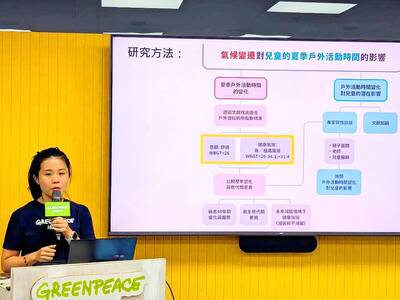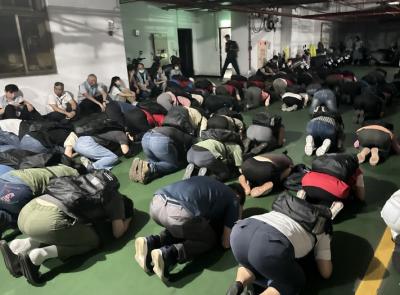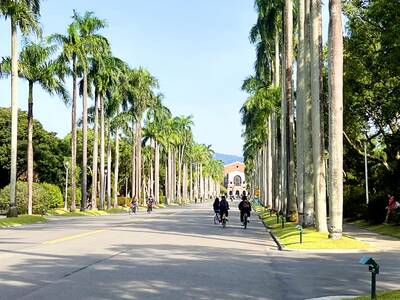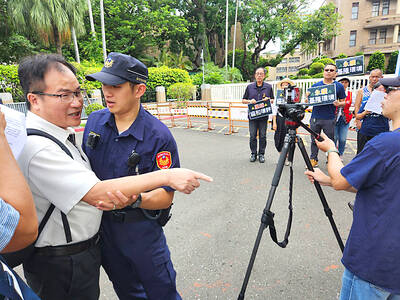The Taipei Veterans General Hospital yesterday said it has developed a way to produce its own cancellous bone chips — small pieces of spongy bone that serve as an osteoconductive scaffold and autograft extender — using recycling damaged cartilage and bones removed in bone replacement surgeries.
The hospital’s Department of Orthopedics director Chen Wei-ming (陳威明) said usually in knee replacement surgery, if the patient agrees to donate removed bone, the hospital keeps the bone frozen and evaluates if it can be used for transplant surgery.
Removed bones have to be cleaned thoroughly to reduce the risk of infection, and bones have different shapes, surgeons have to adjust the bones size and shape before implantation, Chen said, adding that bone from one donor can only be used in one patient and any remaining bone is discarded.
Through a cooperative project between the medical industry and academia that started in September 2011, the hospital’s orthopedic department participated in the development of bone tissues and successfully produced standardized cancellous bone chips in malleable form with chip sizes between 5mm and 10mm and five packaging sizes — 2.5cc, 5cc, 10cc, 20cc and 30cc — for doctors to select.
The cancellous chips are made by cleaning, crushing, packaging and disinfecting bone chips, Chen said.
The chips have been used in more than 100 patients in the past three years at the hospital, with none becoming infected, Chen added.

The government should improve children’s outdoor spaces and accelerate carbon reduction programs, as the risk of heat-related injury due to high summer temperatures rises each year, Greenpeace told a news conference yesterday. Greenpeace examined summer temperatures in Taipei, New Taipei City, Taoyuan, Hsinchu City, Taichung, Tainan and Kaohsiung to determine the effects of high temperatures and climate change on children’s outdoor activities, citing data garnered by China Medical University, which defines a wet-bulb globe temperature (WBGT) of 29°C or higher as posing the risk of heat-related injury. According to the Central Weather Administration, WBGT, commonly referred to as the heat index, estimates

Taipei and other northern cities are to host air-raid drills from 1:30pm to 2pm tomorrow as part of urban resilience drills held alongside the Han Kuang exercises, Taiwan’s largest annual military exercises. Taipei, New Taipei City, Keelung, Taoyuan, Yilan County, Hsinchu City and Hsinchu County are to hold the annual Wanan air defense exercise tomorrow, following similar drills held in central and southern Taiwan yesterday and today respectively. The Taipei Mass Rapid Transit (MRT) and Maokong Gondola are to run as usual, although stations and passenger parking lots would have an “entry only, no exit” policy once air raid sirens sound, Taipei

Taipei placed 14th in the Quacquarelli Symonds (QS) Best Student Cities 2026 list, its highest ever, according to results released yesterday. With an overall score of 89.1, the city climbed 12 places from the previous year, surpassing its previous best ranking of 17th in 2019. Taipei is “one of Asia’s leading higher-education hubs,” with strong employer activity scores and students “enjoying their experience of the city and often keen to stay after graduation,” a QS staff writer said. In addition to Taipei, Hsinchu (71st), Tainan (92nd), Taichung (113th) and Taoyuan (130th) also made QS’ list of the top 150 student cities. Hsinchu showed the

Environmental groups yesterday filed an appeal with the Executive Yuan, seeking to revoke the environmental impact assessment (EIA) conditionally approved in February for the Hsieh-ho Power Plant’s planned fourth liquefied natural gas (LNG) receiving station off the coast of Keelung. The appeal was filed jointly by the Protect Waimushan Seashore Action Group, the Wild at Heart Legal Defense Association and the Keelung City Taiwan Head Cultural Association, which together held a news conference outside the Executive Yuan in Taipei. Explaining the reasons for the appeal, Wang Hsing-chih (王醒之) of the Protect Waimushan Seashore Action Group said that the EIA failed to address